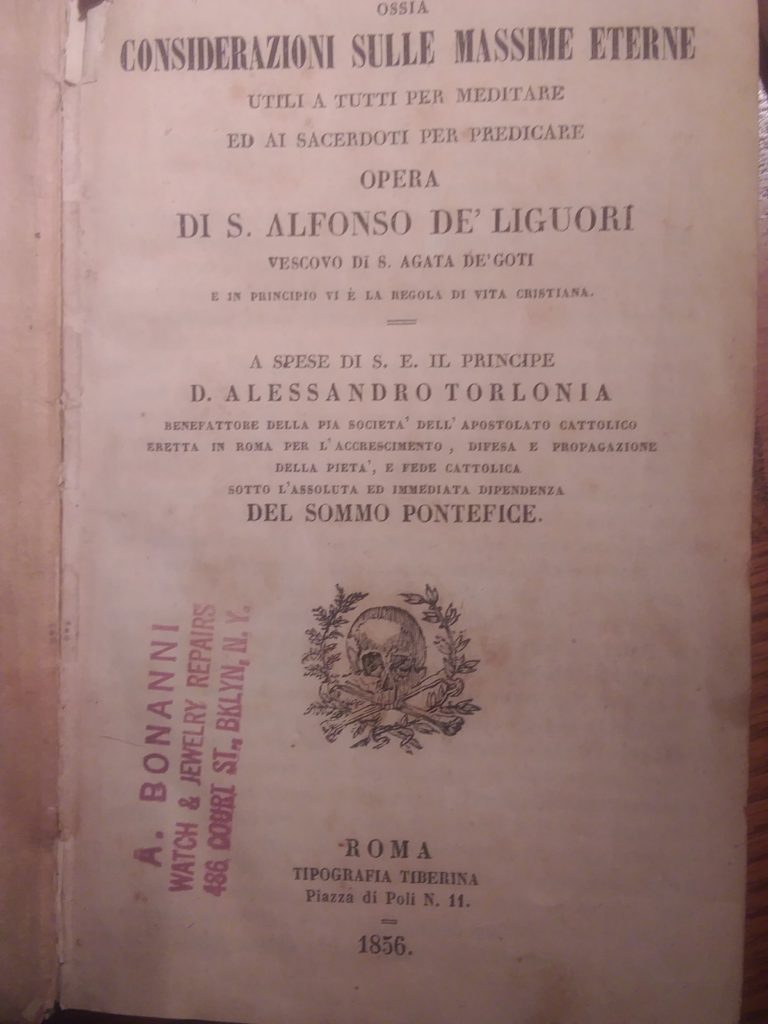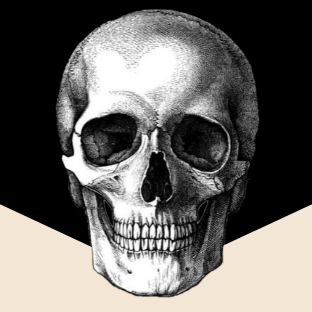
My father had an unusual book that rested on his work desk. It was worn and brown. The covers looked hard, almost like a box. When I was a child, from my view at four feet, the ends seemed tinted, a marbled brown design, chipped at the edges. I imagined it to be a case, a chest filled with things I might find interesting or valuable. I wanted to look inside.
“Don’t touch that, or anything on this table,” my father warned, watching my hand extend toward it.
The book lived on that table for years. It was part of the familiar scenery of my father’s jewelry repair table, along with jars of cleaning solutions in various shades of blue and gray. The fumes from those jars were toxic, and I had to resist a tendency to inhale the aroma.
My father, an immigrant from the mountain villages in Lazio, looked older than his years. I knew him as simply American, a merchant, a watch repairer, my father.
When he worked, he would place a jeweler’s loop against the skin around his eye, squinting and squeezing the facial muscles to secure the single lens over the exposed insides of a watch, preparing it for surgery. I would peer at the conglomeration of tiny ratcheted wheels ticking in concert to keep time. He would carefully place the entire mechanism, which whispered and ticked – responding repeatedly to the tightened force of the spring wheel.. He would disassemble the timepiece, lay it out on a black cloth like a newborn on a pillow, and clean every part in various solutions. The row of covered glass jars offered those intoxicating aromas when he unscrewed the black plastic tops.
The book remained on the worktable, nestled between the jars. I noticed that sometimes it would be between different jars.
But it was always on the table.
Once he finished cleaning the individual parts, my father would begin to rebuild the entire watch, securing every bridge with the tiniest of screws and placing the escape wheel that managed the oscillations of the balance wheel housing the hair-thin coil. Tweezers, clamps, clasps, and cotton held the first parts of the ticking valve. If the spring was installed and sat properly, it would produce regular rhythms of a coiled spring slowly releasing its wound-up pressure—the heart of a timepiece. The watch, now healthy and beating from a new balance wheel transplant, was ready to be put back together and placed in its case. “Non voglio che piu il demonio abbia ad aver dominio dell’anima mia,” my father would mutter.
I did not understand him.
If everything went well, I might be treated to an ice cream sandwich from Augie’s.
Sometimes, my father would lose a spring. It would fly into the air and in the return trajectory land in an obscure spot on the tile floor. Fuller brush in hand, he would go to his knees and sweep up the suspected area in hopes of finding it. There were times when customers thought he had left the store, since the counter separating the work table and the store entrance blocked the view. “Angelo? Are you here?”
A triumphant Angelo would suddenly rise from the floor holding the found spring. “Disgrazia scongiurato!” he would say to the customer, which translated to “misfortune averted!” He would always explain what he said to a customer, assuming they did not know his language.
The customer would smile politely, not quite sure of the nature of the misfortune, while my father opened one of the screw top jars and plunged the spring in the noxious solution to clean it. Then he went about the business of serving the customer.
My father found the quiet of the night the most productive. I would pretend to be secure in bed, and then sneak down to his table, careful not to be discovered by the spill of the sharp, blue florescent jeweler’s lamp. It cast a surreal lowlight to the room, antiseptic and fantastic.
There he was, seated on his rotating rolling stool, squished face bearing a balance of the jeweler’s loop in his right eye, delicately maneuvering the tiniest of metal parts. My father began to utter more words under his breath as he worked on a dismembered watch. “Ah signore e quante notti io misero ho dormito in disgrazia vostra.”
I did not understand him. The brown book was still on the table along with the jars of cleaning solution, but in a different place, again.
When a red Schwinn Hornet bicycle appeared one Christmas morning with twenty-six-inch tires and a fender light, I lost interest in the things on my father’s table. This great claim to mobility brought me beyond the cement backyard on to streets, alleys and avenues outside of the neighborhood. That path to freedom continued into adulthood with cars, always stretching the space between my own life and what my father called home.
Years later, I came across a box containing my father’s effects. There was the hand-crafted jeweler’s loop, numerous tweezers, clamps, a cleaning jar full of spare watch parts rendered useless by digital timepieces and iPhones. Three analog timepieces with gold plated wristbands were wrapped in polishing cloth. The box still retained the toxic, alluring aroma of cleaning solution.
On the bottom, a brown, faux-marbled book, worn at the edges, lay resting on a foam pad normally used to store precious gems. Mottled spots from accidental sprays of cleaning solution stained pages made ochre by age.
The book revealed secrets of my father’s young life. It was a book of prayer given to my father when he entered a Trinitarian school for religious brotherhood in Rome, when he was twelve years old. It was written in Italian, published in 1856. He had underlined certain passages.
Ah signore e quante notti io misero ho dormito in disgrazia vostra. “Oh Lord, how many nights I have slept in your disgrace.”
There was another:Non voglio che piu il demonio abbia ad aver dominio dell’anima mia. “I don’t want the devil to have dominion over my soul anymore.”
And still another: Ah, divino mio re amato mio redentore, venite, e reguate voi soloda oggi avanti nell’anima mia. “Oh, my beloved king, my Redeemer, come, and give yourself up today in my soul.”
The book was written in the Italo-classic vernacular of the 19th century, representative of a literary style used by the church to telegraph a more spiritual, and less political and militaristic, face. It was a response to the social-economic revolution of 1848 occurring in a pre-unified Italian peninsula, where resistance to monarchial power grew into a persistent cultural movement. Phrases like “dominion,” “give yourself up,” and “my beloved king,” alluded to that resistance.
My father, after twenty years as a naturalized citizen, fifteen years as a jeweler, and every year of my life as my father, had still chanted his vespers every day, the daily prayers of a Trinitarian monk.
About the Author:
John Bonanni spent the last forty years in the theatre: on tour, on Broadway, at Radio City Music Hall, and many places in between, managing every sensitive personality he encountered. He now writes about them, among other things. His articles have appeared in Adelaide Literary Magazine, Inspired Living Magazine, and Senior Outlook Today. He is currently enrolled in the MFA in Creative and Professional Program at Western Connecticut State University.
